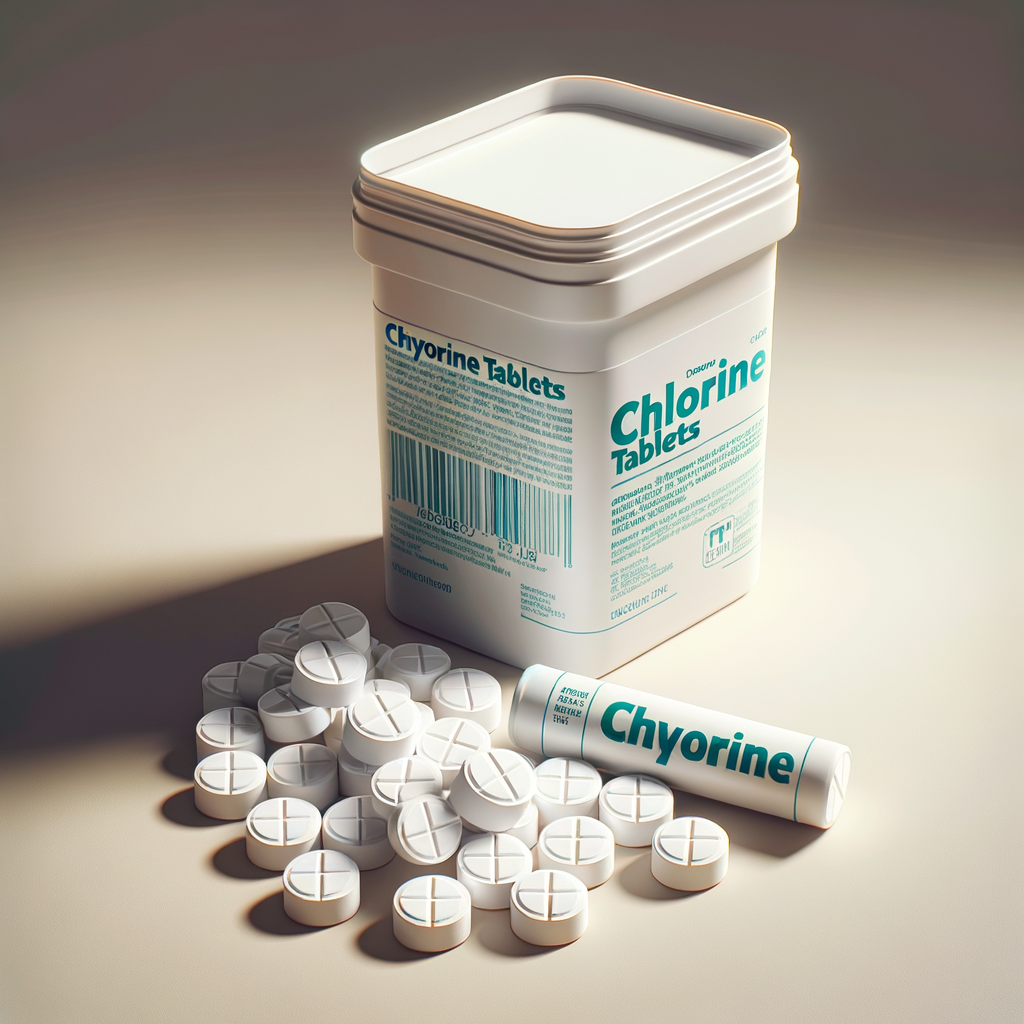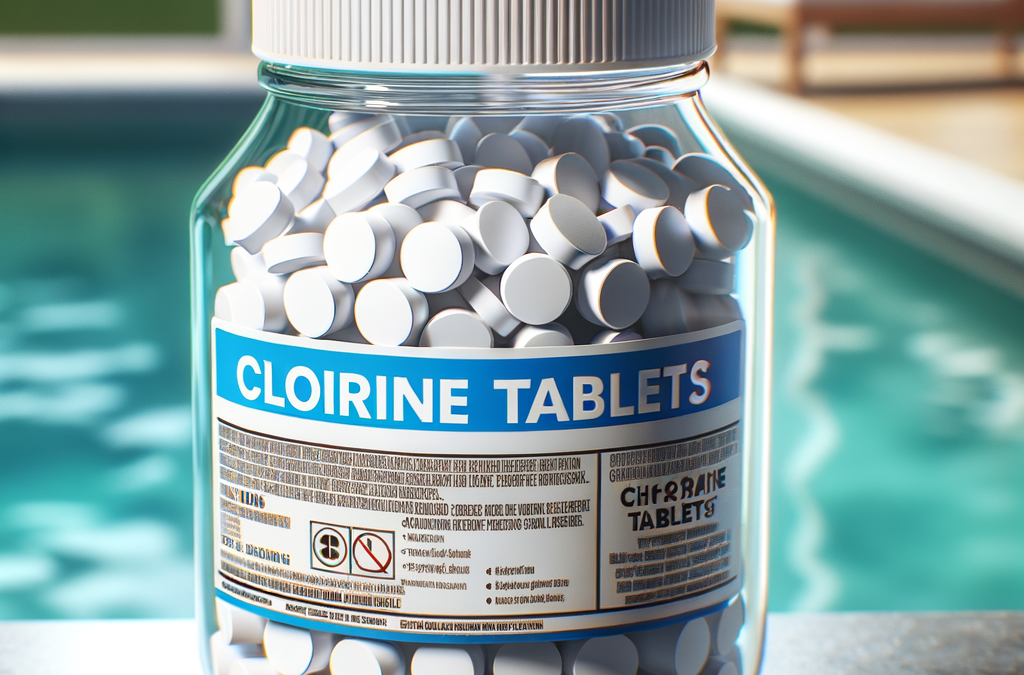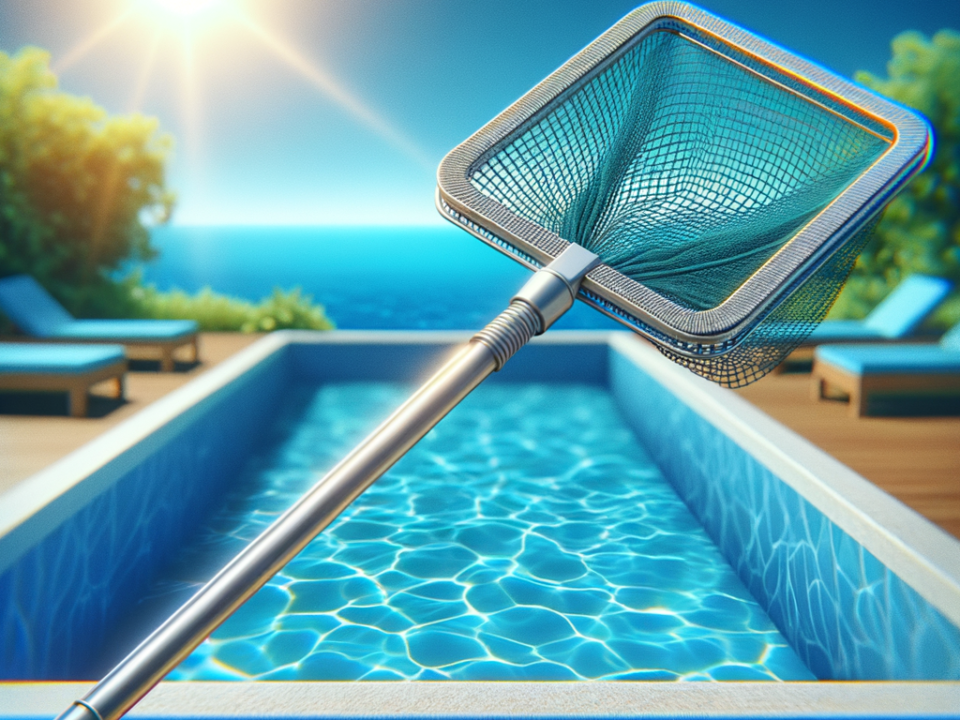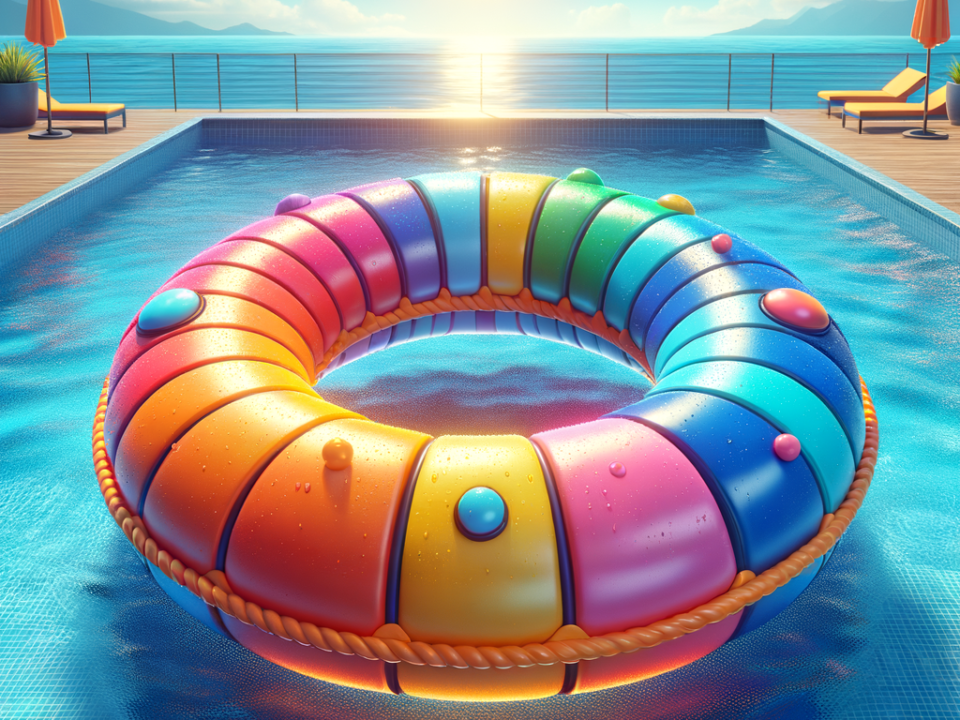
Transform Your Pool Cleaning with the Powerful YouSky Handheld Pool Vacuum
May 22, 2024“Chlorine Tablets Revealed: Unveiling the Power of Pure Water”
Table of Contents
Introduction
Chlorine tablets are a widely used chemical solution for maintaining clean and safe water in swimming pools, hot tubs, and other water systems. These tablets, typically composed of compounds like trichloroisocyanuric acid or sodium dichloroisocyanurate, dissolve slowly in water, releasing chlorine over time. This sustained release helps to effectively kill bacteria, control algae growth, and oxidize organic contaminants, ensuring the water remains clear and hygienic. Chlorine tablets are favored for their convenience, ease of use, and efficiency in maintaining optimal chlorine levels, making them an essential component in water sanitation practices.
Chlorine Tablets Revealed: Common Myths and Facts

Chlorine tablets are a staple in pool maintenance, yet they are often surrounded by a cloud of misconceptions. To ensure a clear understanding, it is essential to separate the myths from the facts. One common myth is that chlorine tablets are harmful to swimmers. While it is true that chlorine is a potent chemical, when used correctly, it is safe and effective. Chlorine tablets are designed to dissolve slowly, releasing a controlled amount of chlorine into the water, which helps to maintain a sanitary environment by killing bacteria and other harmful microorganisms.
Another prevalent myth is that chlorine tablets alone can keep a pool clean. In reality, while chlorine is crucial for sanitization, it is not a catch-all solution. Proper pool maintenance requires a combination of chemical treatments and physical cleaning. This includes regular brushing of pool surfaces, vacuuming, and ensuring the filtration system is functioning correctly. Additionally, it is important to monitor and balance other chemical levels, such as pH and alkalinity, to ensure the chlorine can work effectively.
A fact that often goes unrecognized is the importance of stabilizers in chlorine tablets. Many chlorine tablets contain cyanuric acid, which acts as a stabilizer to protect chlorine from being broken down by the sun’s ultraviolet rays. This is particularly important for outdoor pools, as it helps to maintain consistent chlorine levels, reducing the need for frequent additions of chlorine. However, it is also crucial to monitor cyanuric acid levels, as excessive amounts can lead to a condition known as “chlorine lock,” where chlorine becomes less effective.
There is also a misconception that chlorine tablets can be used interchangeably with other forms of chlorine, such as liquid chlorine or granular chlorine. Each form of chlorine has its specific use and advantages. Chlorine tablets are ideal for continuous, slow-release sanitization, making them suitable for regular maintenance. In contrast, liquid chlorine is often used for shock treatments due to its rapid action, and granular chlorine can be used for spot treatments or to quickly raise chlorine levels. Understanding the appropriate use of each form can lead to more effective pool maintenance.
Furthermore, some believe that the strong smell of chlorine indicates a clean pool. In fact, a strong chlorine odor often signifies the presence of chloramines, which are formed when chlorine reacts with organic matter such as sweat, oils, and urine. Chloramines are less effective at sanitizing and can cause irritation to the eyes and skin. Regular shocking of the pool with a higher dose of chlorine can help to break down chloramines and restore a fresh, clean smell to the water.
Lastly, it is important to address the environmental impact of chlorine tablets. While chlorine is an effective disinfectant, it can have negative effects on the environment if not handled properly. Pool owners should ensure that backwash water is disposed of correctly and not allowed to enter natural water bodies, where it can harm aquatic life. Additionally, using chlorine alternatives or supplementing with other sanitizing methods, such as saltwater systems or UV light, can help to reduce the overall environmental footprint.
In conclusion, chlorine tablets are a vital component of pool maintenance, but it is essential to understand their proper use and limitations. By dispelling common myths and recognizing the facts, pool owners can ensure a safe, clean, and enjoyable swimming environment.
Chlorine Tablets Revealed: Environmental Impact and Alternatives
Chlorine tablets have long been a staple in maintaining the cleanliness and safety of swimming pools, ensuring that harmful bacteria and algae are kept at bay. These tablets, composed primarily of calcium hypochlorite or trichloroisocyanuric acid, dissolve slowly in water, releasing chlorine that acts as a powerful disinfectant. However, while their efficacy in sanitizing water is well-documented, the environmental impact of chlorine tablets is a subject that warrants closer examination.
One of the primary environmental concerns associated with chlorine tablets is the release of chlorine into natural water bodies. When pool water is drained or backwashed, the chlorine it contains can enter rivers, lakes, and oceans. Chlorine is highly toxic to aquatic life, even at low concentrations. It can cause significant harm to fish, invertebrates, and other marine organisms, disrupting ecosystems and leading to a decline in biodiversity. Furthermore, chlorine can react with organic matter in water to form harmful byproducts such as trihalomethanes (THMs) and haloacetic acids (HAAs), which are known to be carcinogenic and pose additional risks to both human health and the environment.
In addition to the direct impact on aquatic ecosystems, the production and disposal of chlorine tablets also raise environmental concerns. The manufacturing process involves the use of hazardous chemicals and generates waste that can contribute to pollution if not managed properly. Moreover, the packaging of chlorine tablets, often made from plastic, adds to the growing problem of plastic waste, which is a significant environmental issue globally.
Given these environmental implications, it is essential to explore alternatives to traditional chlorine tablets that can provide effective water sanitation while minimizing ecological harm. One such alternative is the use of saltwater chlorination systems. These systems generate chlorine through the electrolysis of salt dissolved in the pool water, eliminating the need for chemical chlorine tablets. Saltwater pools tend to have lower chlorine levels, which can be less harmful to the environment when water is discharged. Additionally, the salt used in these systems is less likely to cause adverse effects on aquatic life.
Another promising alternative is the use of ultraviolet (UV) light systems. UV light effectively kills bacteria and viruses by disrupting their DNA, rendering them harmless. This method does not introduce any chemicals into the water, thereby avoiding the environmental issues associated with chlorine. However, UV systems do not provide a residual disinfectant effect, meaning that they must be used in conjunction with other sanitizing methods to ensure continuous water safety.
Ozone treatment is another viable option. Ozone, a powerful oxidizing agent, can effectively neutralize contaminants in pool water. Ozone systems generate ozone gas on-site, which is then dissolved in the water to provide disinfection. Like UV light, ozone treatment does not leave harmful residues and has a minimal environmental footprint. However, it also requires supplementary sanitization to maintain water quality over time.
In conclusion, while chlorine tablets have been a reliable method for pool sanitation, their environmental impact cannot be overlooked. The release of chlorine into natural water bodies, the production and disposal processes, and the associated chemical byproducts all pose significant ecological risks. Exploring and adopting alternative methods such as saltwater chlorination, UV light systems, and ozone treatment can help mitigate these impacts, offering more sustainable solutions for maintaining clean and safe swimming environments. As awareness of environmental issues continues to grow, it is imperative that we consider these alternatives to reduce our ecological footprint and protect our planet’s precious aquatic ecosystems.
Chlorine Tablets Revealed: Safe Handling and Storage Tips
Chlorine tablets are a widely used and highly effective means of maintaining clean and safe water in swimming pools, hot tubs, and other water systems. These tablets, composed primarily of calcium hypochlorite or trichloroisocyanuric acid, release chlorine slowly over time, ensuring a consistent level of disinfection. However, while their benefits are numerous, it is crucial to handle and store chlorine tablets properly to ensure safety and efficacy.
To begin with, understanding the chemical nature of chlorine tablets is essential. Chlorine is a potent disinfectant that eliminates bacteria, viruses, and other pathogens, making it indispensable for water sanitation. However, its reactive nature also means that improper handling can lead to hazardous situations. Therefore, it is imperative to follow specific guidelines to mitigate risks associated with chlorine tablets.
When handling chlorine tablets, always wear appropriate personal protective equipment (PPE). This includes gloves, goggles, and, if necessary, a mask to prevent inhalation of any dust or fumes. Chlorine tablets can cause skin irritation and respiratory issues if not handled with care. Additionally, it is advisable to handle these tablets in a well-ventilated area to minimize exposure to any potentially harmful vapors.
Moreover, it is important to avoid direct contact between chlorine tablets and other chemicals. Mixing chlorine with substances such as acids, ammonia, or organic materials can result in dangerous chemical reactions, including the release of toxic gases or even explosions. Therefore, always use clean, dry tools when handling chlorine tablets and ensure that they are stored separately from other chemicals.
Proper storage of chlorine tablets is equally critical. These tablets should be kept in a cool, dry, and well-ventilated area, away from direct sunlight and moisture. Exposure to heat and humidity can cause the tablets to degrade, reducing their effectiveness and potentially leading to the release of chlorine gas. It is also advisable to store chlorine tablets in their original, tightly sealed containers to prevent contamination and accidental spills.
Furthermore, it is essential to keep chlorine tablets out of reach of children and pets. Accidental ingestion or contact can result in severe health consequences. Therefore, always store these tablets in a secure location, preferably in a locked cabinet or storage area. Additionally, clearly label the storage container with appropriate hazard warnings to alert anyone who might come into contact with it.
In addition to these safety measures, it is also important to be aware of the environmental impact of chlorine tablets. While they are effective at disinfecting water, improper disposal can lead to environmental contamination. Therefore, never dispose of chlorine tablets in regular trash or down the drain. Instead, follow local regulations for hazardous waste disposal to ensure that these chemicals are handled responsibly.
In conclusion, while chlorine tablets are an invaluable tool for maintaining clean and safe water, their handling and storage require careful attention to safety protocols. By wearing appropriate PPE, avoiding chemical interactions, storing tablets properly, and ensuring they are kept out of reach of children and pets, one can mitigate the risks associated with these potent disinfectants. Additionally, responsible disposal practices are essential to minimize environmental impact. By adhering to these guidelines, users can safely and effectively utilize chlorine tablets to maintain optimal water quality.

Chlorine Tablets Revealed: Benefits for Pool Maintenance
Chlorine tablets have long been a staple in the realm of pool maintenance, offering a convenient and effective solution for keeping swimming pools clean and safe. These tablets, typically composed of a stabilized form of chlorine, are designed to dissolve slowly, releasing chlorine steadily into the water. This controlled release ensures a consistent level of sanitation, which is crucial for maintaining the health and safety of pool users. The benefits of using chlorine tablets extend beyond mere convenience, encompassing aspects of efficiency, cost-effectiveness, and overall pool hygiene.
One of the primary advantages of chlorine tablets is their ease of use. Unlike liquid chlorine, which requires careful measurement and handling, chlorine tablets can be simply placed in a floating dispenser, skimmer basket, or automatic chlorinator. This simplicity reduces the risk of over- or under-dosing, which can lead to either insufficient sanitation or excessive chlorine levels that may cause skin and eye irritation. Furthermore, the slow-dissolving nature of these tablets means that pool owners do not need to add chlorine as frequently, thereby saving time and effort.
In addition to their user-friendly nature, chlorine tablets are also highly efficient in maintaining pool cleanliness. The stabilized form of chlorine used in these tablets is less susceptible to degradation by sunlight, which is a common issue with unstabilized chlorine. This stability ensures that the chlorine remains effective for a longer period, providing continuous protection against bacteria, algae, and other harmful microorganisms. Consequently, pool owners can enjoy crystal-clear water with minimal maintenance.
Cost-effectiveness is another significant benefit of chlorine tablets. While the initial purchase price of these tablets may be higher than that of liquid chlorine, their long-lasting nature and reduced need for frequent application can result in overall cost savings. Additionally, the consistent release of chlorine helps to prevent the growth of algae and bacteria, which can lead to costly and time-consuming clean-up efforts if left unchecked. By investing in chlorine tablets, pool owners can potentially reduce the need for additional chemical treatments and maintenance services.
Moreover, the use of chlorine tablets contributes to the overall hygiene and safety of the swimming environment. Chlorine is a powerful disinfectant that effectively kills a wide range of pathogens, including bacteria, viruses, and protozoa. By maintaining an appropriate chlorine level, pool owners can significantly reduce the risk of waterborne illnesses and infections. This is particularly important in public and commercial pools, where the high turnover of swimmers increases the likelihood of contamination. Chlorine tablets provide a reliable means of ensuring that the water remains safe for all users.
In conclusion, chlorine tablets offer a multitude of benefits for pool maintenance, making them an indispensable tool for both residential and commercial pool owners. Their ease of use, efficiency, cost-effectiveness, and ability to maintain high standards of hygiene underscore their value in the realm of pool care. By incorporating chlorine tablets into their maintenance routine, pool owners can enjoy the peace of mind that comes with knowing their pool is clean, safe, and inviting for swimmers. As such, chlorine tablets continue to be a preferred choice for those seeking a reliable and effective solution for pool sanitation.
Q&A
1. **What are chlorine tablets used for?**
Chlorine tablets are used to disinfect and sanitize swimming pools, hot tubs, and drinking water by killing bacteria, viruses, and other harmful microorganisms.
2. **How do you use chlorine tablets in a pool?**
Chlorine tablets are typically placed in a floating dispenser, skimmer basket, or automatic chlorinator, where they slowly dissolve and release chlorine into the water to maintain proper sanitation levels.
3. **Are chlorine tablets safe for all types of pools?**
Chlorine tablets are generally safe for most types of pools, including in-ground and above-ground pools, but it’s important to follow manufacturer guidelines and regularly test water chemistry to avoid damage to pool surfaces and equipment.
4. **What precautions should be taken when handling chlorine tablets?**
When handling chlorine tablets, wear protective gloves and eyewear, avoid inhaling fumes, store them in a cool, dry, and well-ventilated area away from other chemicals, and keep them out of reach of children and pets.
Conclusion
Chlorine tablets are an effective and convenient method for disinfecting water, particularly in swimming pools and drinking water systems. They release chlorine slowly, ensuring a consistent level of sanitation over time. This helps in killing bacteria, viruses, and other pathogens, thereby maintaining water quality and safety. However, proper handling and storage are essential to avoid potential hazards, such as chemical burns or respiratory issues. Overall, chlorine tablets are a reliable solution for water disinfection when used correctly.





